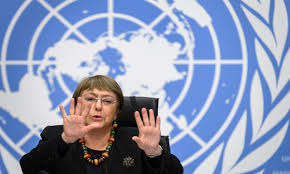According to a Chinese letter seen by reporters and corroborated by diplomats from three different nations who received it, China is requesting that the UN human rights chief bury a highly anticipated report on human rights crimes in Xinjiang.
After receiving harsh criticism from the general public for being too lenient toward China during a visit in May, UN High Commissioner Michelle Bachelet announced she will not run for re-election for personal reasons.
However, she has promised to write a report on the western Chinese region of Xinjiang before she departs at the end of August. Rights organizations charge Beijing with mistreatment of the Uyghur people living in Xinjiang, including the widespread use of forced labor in internment camps. China has vehemently refuted the claims.
According to four sources—three diplomats and a rights expert who all spoke on the condition of anonymity—the letter was written by China expressing “great concern” about the Xinjiang report and seeks to prevent its distribution. They claimed that starting in late June, China sent it to diplomatic missions in Geneva and requested that other nations sign it to express their support.
When referring to Bachelet’s office, the letter said, “The assessment (on Xinjiang) will intensify politicization and bloc confrontation in the area of human rights, undermine the credibility of the OHCHR (Office of the High Commissioner for Human Rights), and harm the cooperation between OHCHR and member states.”
We implore Madame High Commissioner to refrain from publishing such a judgment.
A representative for China’s diplomatic office in Geneva, Liu Yuyin, declined to comment on whether the letter had been sent or to address inquiries regarding its substance.
According to Liu, approximately 100 nations have recently voiced their opposition to meddling in China’s domestic affairs under the guise of human rights as well as their support for China on matters pertaining to Xinjiang.
This support was expressed in speeches made in public at the most recent U.N. Human Rights Council meeting, which ended on July 8, as well as in the “joint letter,” as Liu called the document signed by China and the other signatories.
Bachelet would have seen a “genuine Xinjiang with a safe and stable society” when she visited the area during her May trip to China, a representative for the Chinese foreign ministry told reporters.
The spokesperson predicted that efforts by other nations to “smear China’s image” through the Xinjiang problem would fail.
It was unclear if Bachelet had received the letter, and a representative for OHCHR declined to comment.
Prior to being made public, the Xinjiang report is being finalized, he continued, noting that this involves the customary procedure of sending China a copy for review.
The study will discuss how China treats its Uyghur minority. Its release has been postponed for months for unknown reasons after a team of rights specialists started compiling evidence for it more than three years ago.
Reporters were unable to determine how many people signed the letter. One of the four sources a diplomat residing in Geneva enthusiastically responded to the letter and offered his nation’s cooperation.
The Xinjiang report, according to a different version of the letter seen by reporters, was produced “without a mandate and in significant contravention of OHCHR duties” and would damage Bachelet’s reputation.
Who changed it or for what reasons were unclear. The letter’s diplomat signatory claimed that the softer version was the final one.
STRAIGHT LOBBYING
Like other nations, China occasionally tries to persuade others to back its political remarks within the Geneva-based rights council by sending diplomatic communications.
These can occasionally affect the 47-member Council’s judgments, which are not legally enforceable but can authorize inquiries into alleged infractions.
China’s letter, according to two Geneva diplomats, is a rare instance of proof that Beijing is attempting to personally influence Bachelet. They claim that because of the extensive economic relations between countries and China, it can be challenging to reject China on human rights problems.
The memo comes at a crucial time for the U.N. rights agency as Bachelet’s term is coming to an end and no replacement has yet been named. Bachelet, 70, will be leaving her position on Aug 31.

















